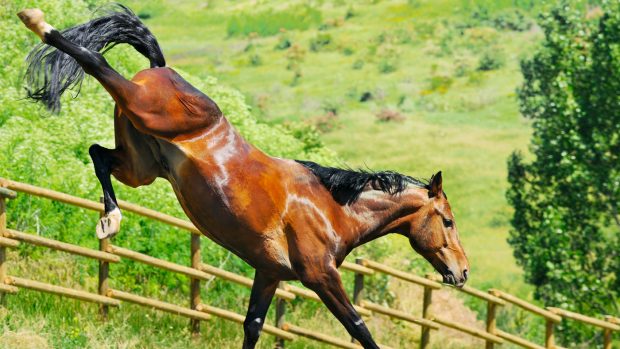Mares frequently come to the vet with a history of behaving badly or being difficult to train or manage when they are in season (oestrus). Occasionally, mares may show stallion-like or nymphomaniac behaviour.
Some mares experience pain and/or colic during oestrus around ovulation. In these animals, medicines to alter their cycle can help, such as treatments to encourage the follicle to ovulate.
Hormonal products
Vets may be asked to supply a hormonal product to help. The only hormone that can effectively suppress the behavioural signs of heat is progesterone. In this country, only the synthetic progesterone–like drug Equine Regumate, which is an oil solution for oral use, is approved for use in horses.
To suppress signs of heat effectively, Regumate needs to be either given in the feed or syringed into the mare’s mouth every day. It may take several days to work and the oily solution can be tricky to administer, so owners must wear gloves whenever handling the product. Although it is the most commonly used method to suppress oestrus, behavioural problems may well recur following cessation of treatment.
Although Regumate has a product licence for use in horses, it is important to remember that it is regarded as a “prohibited substance” by the governing bodies of organisations such as the Jockey Club. This means that any horse must be off the medication for at least eight days before racing. Other organisations, such as the FEI, do permit mares to compete on Regumate.
Surgery
Surgical removal of the ovaries of badly behaving mares is recommended in some cases. Their reproductive cycle will, of course, cease but in several cases oestrous behaviour persists. The mare is permanently prevented from breeding and the surgery is expensive and not without risk. This drastic approach should be considered only after careful thought.
Vaccination
In Australia a vaccine is marketed to immunise the mare against the hormones responsible for the bad behaviour. This vaccine is called Equity and is used successfully to prevent bad behaviour.
A single injection will be effective for anywhere from six to 24 months. As far as is known, the vaccine is safe, although since it has been used for only a few years there is not enough information on any long-term detrimental effects on breeding.
Marbles
Placing a sterile 35mm glass ball into the mare’s uterus to suppress oestrous behaviour was first described Dr Gary Nie and his colleagues from North America in 2001.
There appears to be no discomfort, nor, from Dr Nie’s studies, any detrimental effects on future breeding prospects. Results so far indicate that around half of the mares were kept out of heat following placement of a marble.
The technique is not widely used in Britain at the moment, and Dr Nie has no figures on how wide its use is in the United States, but he believes that marbles are being used in many breeds and in many areas of the horse industry.
It is possible that there may be long-term effects on fertility, and owners must be aware of this before choosing the technique.
Other methods
Another approach would be to put the mare in-foal. However, a few pregnant mares will display behavioural signs of oestrus. After giving birth, the behavioural problems may reappear, and there may also be some loss of conformation following foaling.
Another potentially controversial technique was presented at the British Equine Veterinary Association annual congress. A number of mares were inseminated and scanned 18 days later. If an early pregnancy was detected, it was gently squeezed to rupture and destroy it. The corpus luteum (the part of the ovary that produces progesterone) persisted in all the mares and they remained out of heat for an average of three months.
This technique involves repeated examination of the mare prior to insemination and the need for a source of semen, presumably at some financial expense. Some owners may also not agree with the idea of aborting an early pregnancy for behavioural reasons.
|
||
 |
||


 Get up to 19 issues FREE
Get up to 19 issues FREE TO SUBSCRIBE
TO SUBSCRIBE 



